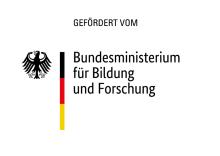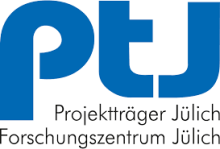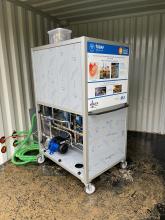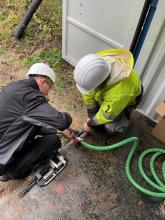Heat storage in collieries in the Ruhr region



| Project manager | Project manager | Project duration |
|---|---|---|
| Prof. Dr.-Ing. Tobias Fieback Dr.-Ing. Thomas Grab | Dipl.-Wi.-Ing. Lukas Oppelt MBA. Timm Wunderlich | 1 July 2022 to 30 June 2025 |
About the project
Background
Renewable energy sources have been steadily expanded in Germany for more than 20 years. The share of renewable energies has grown steadily, particularly in the electricity supply. However, the supply of renewable heating and cooling has stagnated. A key problem here is the lack of seasonal storage options, e.g. to utilise solar surpluses from the summer to cover the higher demand in winter. On the Fraunhofer IEG site in Bochum, the near-surface IEG small mine has already been developed with three boreholes in order to utilise it as a future heat storage facility. In addition, a solar thermal system with an output of 30 kW has already been installed, allowing the mine water to be heated up to 60°C and re-injected (stored).
Project WINZER
The existing plant in Bochum will be used as part of the project to carry out holistic condition monitoring. This will provide insights into the hydrochemical, microbiological, geomechanical and groundwater-economic properties of the mine water. In addition, the plant components will be analysed as a function of cyclical operation. Based on the conclusions to be drawn, concepts and technologies for the feasibility and optimisation as well as the safe operation of heat storage facilities in former coal mines can be derived.
The project pursues the following overall objectives:
- To demonstrate the potential and challenges of mine heat storage systems in urban conurbations under various non-ideal boundary conditions
- To test and implement the transferability to other locations
- To investigate the special features of the different types of coal with regard to pollutant mobilisation in relevant temperature ranges
The TU Bergakademie Freiberg is looking at the heat transfer system between underground heat storage and heat consumers or heat suppliers above ground. heat suppliers above ground. A miniaturised groundwater geothermal plant including a heat transfer system is to be developed, constructed and set up at the IEG Kleinzeche site. This test rig will be used to develop, test and optimise an innovative heat transfer system, including consideration of the optimum system operation, possible pre-treatment processes and modified heat exchangers. In addition, a selection of the most important surface parameters will be made to quantify the fouling reduction potential for the components around which groundwater flows.
Project partners involved
The project is being led by the Fraunhofer IEG in Bochum. In addition to the TU Bergakademie Freiberg, the Ruhr University Bochum (Chair of Urban Water Management and Environmental Technology, Chair of Hydrogeochemistry and Chair of Geothermal Energy Systems) and delta h Ingenieurgesellschaft mbH are part of the project consortium.

Fraunhofer Research Institution for Energy Infrastructures and Geothermal Energy IEG





